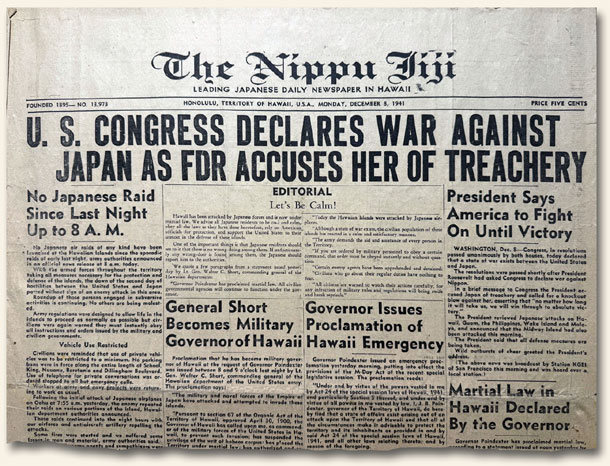“Printing In The Americas” – A reference book for your shelves…
March 2, 2026 by TimHughes · Leave a Comment
 There are very few reference books which are exclusive to newspapers, so some of the better ones are about printing in general, peppered with historical accounts of newspaper publishing as well.
There are very few reference books which are exclusive to newspapers, so some of the better ones are about printing in general, peppered with historical accounts of newspaper publishing as well.
One of my favorites is such a book, titled “Printing In The Americas” by John Clyde Oswald. Done by the Gregg Publishing Company in 1937 it unfortunately is out of print, however copies can be found on book dealer shelves across the country. With the broad scope of internet sites abebooks.com and alibris.com I suspect it would not be difficult to find a copy.
There are 91 chapters totaling over 560 pages but it can essentially be considered to have three parts. first: a general history of printing in colonial America which includes much on early newspapers; second: a state by state review of the their first printing efforts, most of which were newspapers rather than books or pamphlets; and third: printing history in other countries of the Western hemisphere including Canada, Central America, South America and the West Indies, typically not dealt with in most printing history efforts.
I find the Midwest and Western states to have the most intriguing histories, filled with stories of tragedy & hardship in trying to operate a printing establishment in the wilds of America. There were far more failures than successes. Early printers must certainly have come from hearty and optimistic stock.
While we do not have one to offer, this is a title I would suggest you pursue. Given its format it doesn’t have to be read cover to cover, but rather chapters of interest stand alone as little histories in just a few pages.
Announcing: Catalog 364 – Released for March, 2026 – Rare & Early Newspapers…
February 27, 2026 by GuyHeilenman · Leave a Comment
Catalog 364 (for March): This latest offering of authentic newspapers is comprised of over 300 new items, a selection which includes the following noteworthy issues: an issue re: the Olive Branch Petition, Hawaii’s first English language newspaper, “The Crisis” essay #9 by Thomas Paine, a first report of Lincoln’s assassination, a Civil War prison camp newspaper, an early newsbook from 1643, the historic “Funding Act”, and more.
The following links are designed to help you explore all available items from this latest edition of our catalog:
Abridged Catalog (EXCLUDES wholesale lots & titles sold only by year (not by a specific date)
A PDF Version of the Catalog (printable)
Entire Catalog grouped by Era:
1500-1799 (full view OR quick-scan/compact view)
1800-1899 (full view OR quick-scan/compact” view)
1900-Present (full view OR quick-scan/compact” view)
The following links focus on both this month’s and last months catalogs:
- Combined Catalogs (entirety of both)
Become a Premium Member to receive hard copy versions of our catalogs (U.S. residents only).
February Newsletter (2026) – Timothy Hughes Rare & Early Newspapers…
February 13, 2026 by GuyHeilenman · Leave a Comment
|
|
|
|
Announcing: Catalog 363 – Released for February, 2026 – Rare & Early Newspapers…
January 30, 2026 by GuyHeilenman · Leave a Comment
Catalog 363 (for February): This latest offering of authentic newspapers is comprised of over 300 new items, a selection which includes the following noteworthy issues: a Massachusetts Spy with the desired “Join or Die” snake engraving, a Pennsylvania Ledger with the Olive Branch Petition, one of the rarest of early American magazines, The Jew Bill: striving for equal rights for Jews, a handsome colonial New York newspaper from 1745, a fine report on the death of George Washington, and more.
The following links are designed to help you explore all available items from this latest edition of our catalog:
- Abridged Catalog (EXCLUDES wholesale lots & titles sold only by year (not by a specific date)
- A PDF Version of the Catalog (printable)
- Entire Catalog grouped by Era:
1500-1799 (full view OR quick-scan/compact view)
1800-1899 (full view OR quick-scan/compact” view)
1900-Present (full view OR quick-scan/compact” view)
The following links focus on both this month’s and last months catalogs:
- Combined Catalogs (entirety of both)
Become a Premium Member to receive hard copy versions of our catalogs (U.S. residents only).
Two Discoveries, One Powerful Reminder – It Started with the Pony Express…
January 26, 2026 by GuyHeilenman · Leave a Comment
From the very beginning, a recurring theme on the History’s Newsstand blog has been the joy of finding hidden gems—those golden nuggets tucked within historic newspapers. Collectors of rare and early papers know this thrill well: you acquire an issue for one reason, only to uncover something unexpected that proves equally—if not more—captivating.
That’s exactly what happened to me recently while examining the April 16, 1860 issue of The Evening Post (New York). My original goal was to locate coverage of the completion of the first run of the Pony Express, and to my delight, I found not one but two front-page reports. Front-page coverage of such events is rare enough—but two related pieces? A true collector’s treat.
As I continued browsing for additional Pony Express material within the issue, I stumbled upon one of those unforgettable “hidden gems”: a printed exchange between a runaway slave and his former master. While not an account of a major historical event, few subjects evoke as much emotion as slavery, and reading such raw, personal correspondence in a period newspaper was deeply moving.
While the issue’s collectible value is likely anchored by its Pony Express reports, it’s this second discovery that continues to resonate with me. It serves as a poignant reminder—to me, my family, and my friends—of the immeasurable worth of every human being. Each of us, created in God’s image, carries equal and sacred value. Red and yellow, black and white—we are all precious in His sight.
All right, I’ll step down from my soapbox now. The photos below provide context for the discoveries mentioned above. Thanks for reading—and for sharing in the joy of finding history’s hidden treasures.
One of the Two Reports regarding the Pony Express
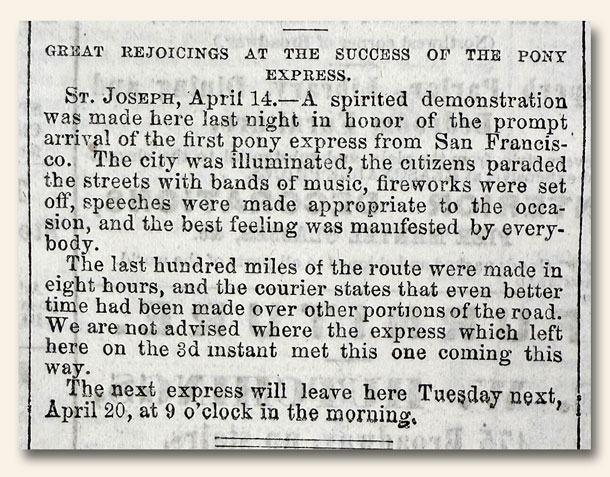
Correspondence Between the Runaway Slave and his former “Master”
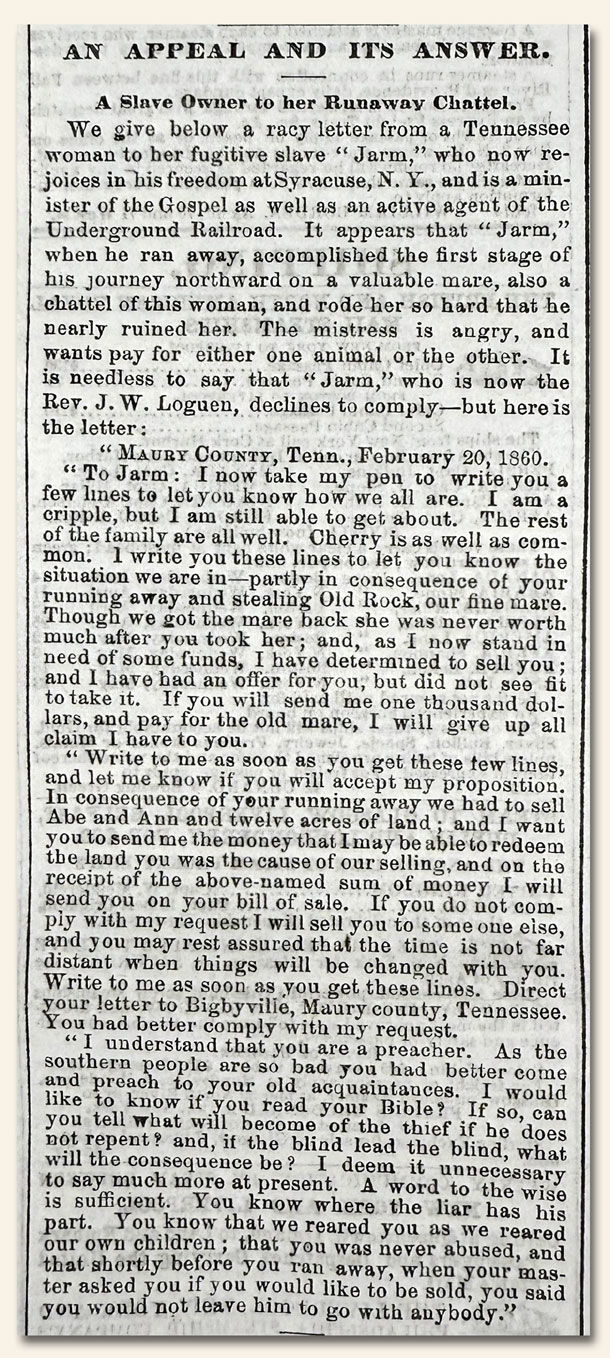

January Newsletter (2026) – Timothy Hughes Rare & Early Newspapers…
January 19, 2026 by GuyHeilenman · Leave a Comment
| Welcome to the first newsletter of 2026. The past few weeks have been pregnant with in-house discoveries – several which are included within new listings or through the highlights shown below. For those who love to collect, appreciate history, and desire to be life-long learners, this hobby brings all of these together with the added bonus of “context” – the capacity to at least partially grasp how those who actually experienced key events perceived what we now call history. I love this collectible! No, my enthusiasm was not AI enhanced/generated. 🙂
Let’s jump right in with a few important links (don’t miss the “discoveries”):
Dr. B Church Jr – American Traitor (E22) Field Music Corps – The Drummer Boys of the Revolution (E23) Battle of Quebec – “Unsuccessful but Brave Attempt” (E24)
The Weekly Chronotype (turns out it’s a notable abolitionist newspaper) The Nippu Jiji… (turns out it’s not a Nippon Fiji)
The Spirit of the West Returns… America Returns to Her Roots… 1776-2026: The Dream Still Shines at Dawn’s Early Light! Popcorn, Principle, & the Presidency: JFK’s Quiet Stand for Artistic Courage… A Colonial “2nd forgery” with intriguing backstory… Cape Fear (pt. II)…
From Dreams to Reality… Dr. Martin Luther King Jr. Paves the Way… |
|
1776-2026: The Dream Still Shines at Dawn’s Early Light!
January 5, 2026 by GuyHeilenman · Leave a Comment
Whether we call it the Semiquincentennial, America250, the Quarter Millennial, the Sestercentennial, or simply the 250th birthday of the boldest experiment in self-government, 2026 rises like a new dawn—filled with promise, reflection, and hope for every American and every friend of liberty across the world.
The front page below, taken from a newspaper celebrating the Centennial Fourth of July in 1876, carries us back to that earlier moment of celebration—a time when a young nation looked proudly to its past and eagerly toward its future. It reminds us of the countless generations whose courage and sacrifices made possible Franklin D. Roosevelt’s enduring truth:
“We are a nation of many nationalities, many races, many religions—bound together by a single unity, the unity of freedom and equality.”
That vision still lights our way. Yet we are also called to remember Frederick Douglass’s wise and urgent reminder, spoken on the 23rd anniversary of emancipation in the District of Columbia:
“The life of the nation is secure only while the nation is honest, truthful and virtuous.”
As we celebrate this extraordinary milestone, may we lift our hearts in gratitude for the Divine grace that has guided us through triumph and trial alike. And as we look ahead, may we renew our shared promise—to preserve every hard-won freedom and to keep lifting the banner of justice, opportunity, and dignity for all who call this land home.
Here’s to the journey still unfolding. Here’s to the dream still alive.
Happy 250th, America!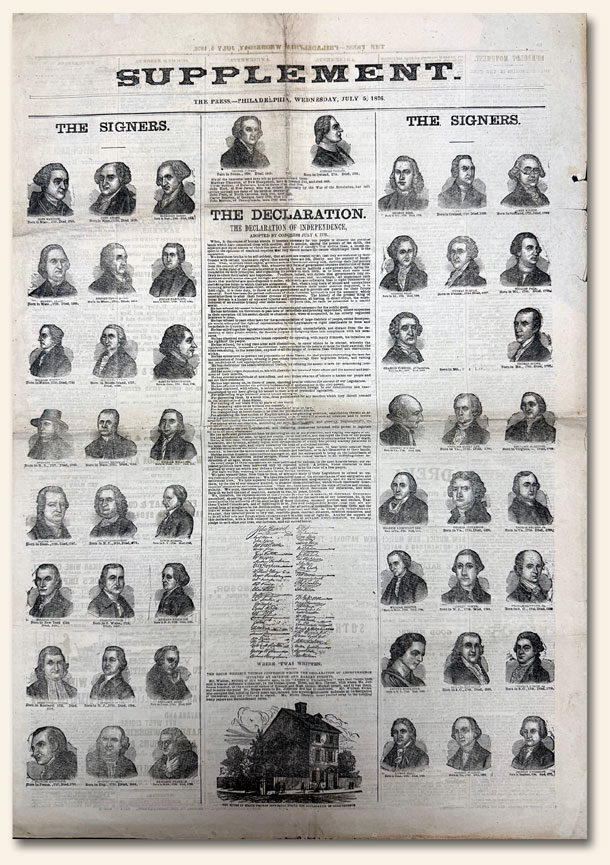
Christmas through the eyes of a newspaper from 1794…
December 25, 2025 by GuyHeilenman · Leave a Comment
As I was searching through our newspapers published on Christmas from the past in the hopes of finding one which would be potentially meaningful to our collecting friends, I came across a December 25, 1794 London Gazette which seemed to hit the mark. I’d love to know if you agree.
Under the heading “AMERICA” on page three I found the entire text of President George Washington’s State of the Union address. It is quite lengthy, and the entire text can be found online, but I was struck by the first and last paragraph – both of which are shown below. Is it me, or could these words have been penned today? Merry Christmas!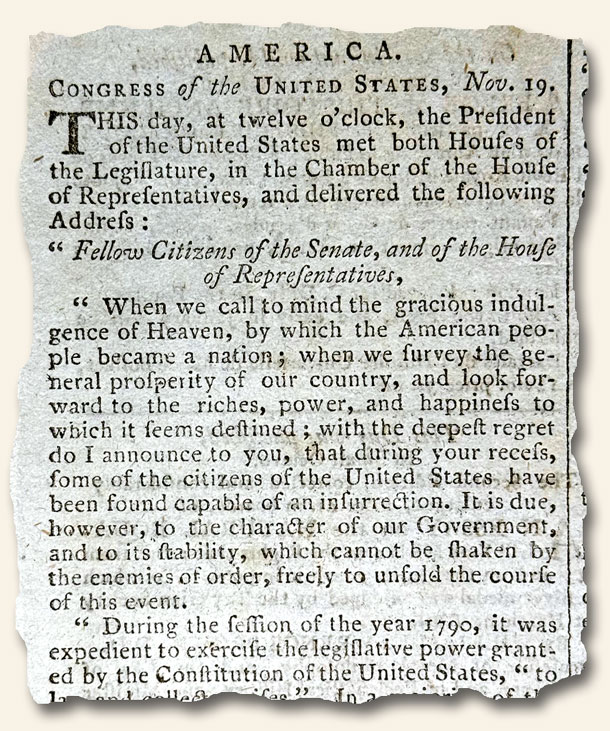
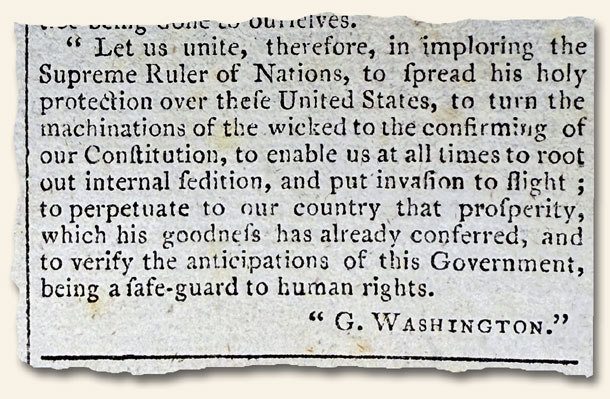
Holiday Newsletter (2025) – Timothy Hughes Rare & Early Newspapers…
December 15, 2025 by GuyHeilenman · Leave a Comment
| Welcome to the Holiday Newsletter from Rare & Early Newspapers. Whereas a number of interesting items are included below, don’t miss out on one of our posts from a few years ago: “Yes, Virginia, there is a Santa Claus“.
This month’s highlights: 1) Newly Listed Catalog Items – The list of items which have been added to our most recent catalog after it went to print continues to grow – including a number of great (highly collectible) issues. These new listings may be viewed at: NEWLY ADDED CATALOG ITEMS 2) Discounted Issues (50% off): 100+ items have been added to last month’s list of discounted issues – each discounted by 50% (as shown) through January 15, 2026! Take a look; you won’t be disappointed: DISCOUNTED ITEMS (50% off) 3) Catalog 361 – Wonderful items from the December catalog still a remain. The available issues may be viewed at: CATALOG 361 4) Holiday-themed content – over 80 collectible newspapers with a Christmas, Hanukkah, or New Year’s theme are available at: ISSUES w/ HOLIDAY-THEMED CONTENT (you may need to view the full description if the “holiday content” is secondary to an historic report) 5) Additional Ideas for Gift Giving:
* Note re: Holiday Shipping – We are sending this newsletter a bit earlier than usual to increase the chance that any item/s ordered will arrive in time for Christmas. If historic/rare newspapers are part of your gifting plans this year, please know we will make every effort to ship incoming orders within 48 business hours. 6) The History’s Newsstand Blog – bi-weekly posts of potential interest to those who collect rare & early newspapers. An aye aye lemur’s handful of recent posts includes:
|
|
Publishing Under Fire: The Nippon Fijii and the Aftermath of Pearl Harbor…
December 8, 2025 by GuyHeilenman · Leave a Comment
It’s difficult to fathom what it must have been like to be a Japanese-American living in Hawaii at the time of the Pearl Harbor attack. According to the 1940 census, more than 150,000 Japanese-Americans—roughly 35% of Hawaii’s population—suddenly found themselves in an impossible position, caught between loyalty to their home and suspicion from their neighbors.
Fear quickly swept through the islands. While the sheer size of the Japanese-American community made mass internment in Hawaii unfeasible, more than 2,000 individuals were arrested, many later sent to internment camps on the mainland. Their lives—and their trust in the nation they called home—were forever changed.
It was in the midst of this uncertainty and fear that the staff of NIPPON FIJI, Hawaii’s leading Japanese-language newspaper, produced their December 8, 1941 issue. The paper stands today as one of the most striking and rare firsthand publications from that dark and defining moment in American history.
